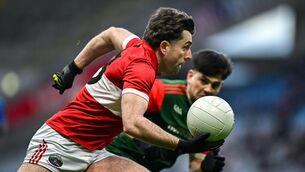Croker opening set for re-airing
The most important matter to occupy the thoughts and minds of delegates from Ireland and abroad will be the interim report of the Rule Book Task Force which advocates a new step-by-step disciplinary structure.
However, based on recent rumblings in Cork and criticism from other quarters, it’s considered probable that the Central Council decision to give the go-ahead for two competitive rugby internationals and three European soccer internationals to be played in Croke Park next year will be questioned.














